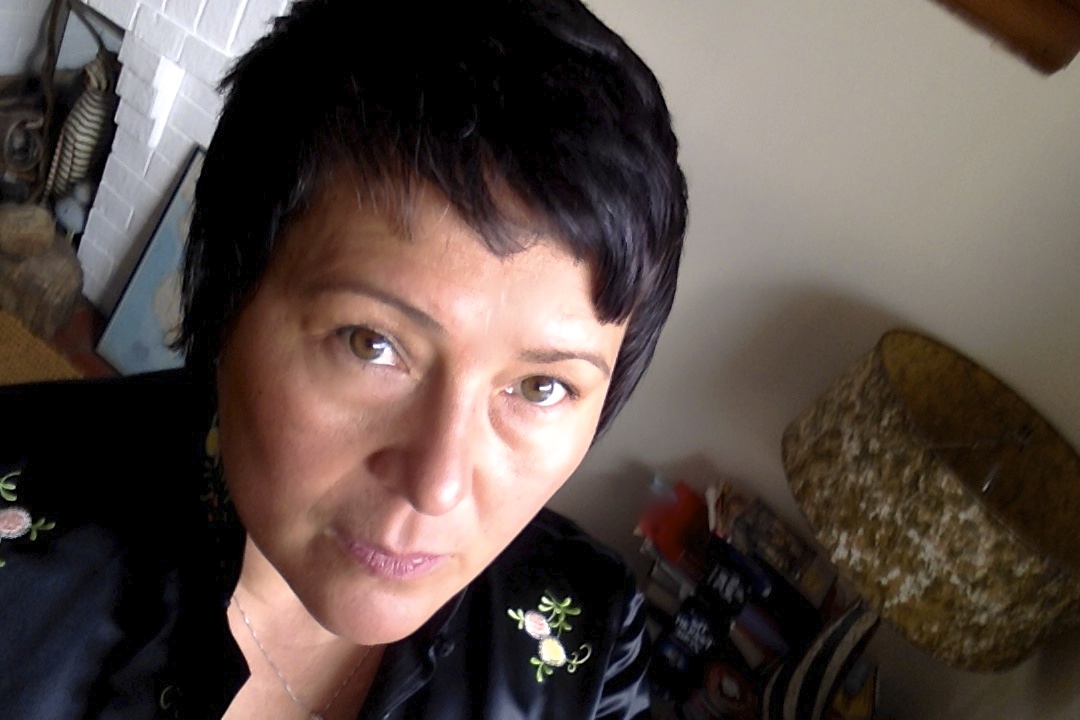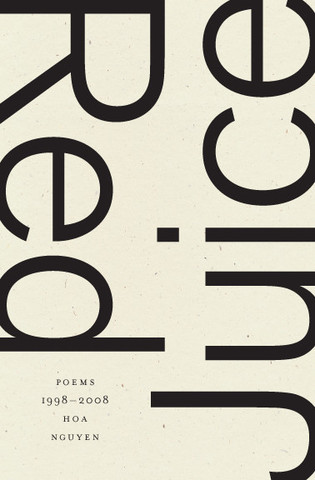RUSTY TALK WITH HOA NGUYEN
W]hat matters to me in poetry is when poetry risks saying something and addresses the complicated mess that is modernity. Jacqueline Valencia: I remember first seeing you read at Maggie Helwig's Bread and Honey series. You read a couple of poems about your mother and mentioned how protective you are of her photographic images and her history. I'm empathize because I'm wary of writing about my daughter for similar reasons. When you are inspired by the personal? Is there a way you go about writing your poetry with it? Is there a process whereby you try to be conscious of the subject you are writing about or do you allow it to flow? Hoa Nguyen: I guess I do both. I'm writing simultaneously about my mother's life and about Vietnam as a place. Vietnam and Vietnamese women tend to be portrayed as a stereotype and a one-dimensional monolith in the North American imagination (both often serving to center European experiences)—I'm writing in response to these conditions. One way I get into my process for this series in particular is to work with the I Ching. It also involves many source texts including a small arsenal of Vietnamese folk tales, myths, and children stories—and research. JV: On social media you're very outspoken when you see an injustice and are willing to take a public stand. It's fearless. What drives you to that fearless place? What matters to you in poetry? HN: I've always been a champion of and rooted for "the underdog"—probably from my experiences with xenophobia, stereotypes, and ordinary racism. Maybe I'm a bit of a fighter by nature. Nothing makes me see red faster than an injustice. I've come to think that this, my temperament and resilience and willingness to address things head-on, helped to ensure my survival—that I managed to persevere in part due to sheer grit, despite the disadvantaged circumstance of class and race. I guess in a related way, what matters to me in poetry is when poetry risks saying something and addresses the complicated mess that is modernity. In poetry, I do not care for the cutesy or exploitive sentimentality or ironic posturing or empty abstraction. JV: So much in your collection Red Juice spoke to me. Motherhood, contrasts of parental homelands with the American experience, etc. One poem in particular felt like a bridge of childhood and adulthood (“Untouched Bubble Gum Me”). You experiment with experience in it, a playfulness mixed with a keen analysis in just a few words. What excites you about poetry today as an expressive and experimental medium? HN: Thanks—I'm fond of that poem, too. I love when poems disrupt expectations, are dissonant, cut and bend in unexpected ways, are sonically interesting, and allow me as reader to participate in the meaning-making of the poem. JV: What are you working on now? HN: I'm trying to work myself out of a stall on my linked narrative project (mostly that looks like avoidance, ha ha)—and writing each week in the workshop I have run for the last 17 years. Right now, I'm writing through the collected poems of Frank O'Hara (we are in the Lunch Poems section of the work: so great). I'm also prepping to write through the poems of John Wieners—so lots of related reading: essays, his letters and journals, etc. Meanwhile I'm preparing for a couple of talks, one at Hamilton College, where I'm revising and updating a talk I gave at Naropa's Jack Kerouac School in February that Bhanu Kapil wrote about here. The other talk is on pedagogy of teaching poetry to be delivered in Seattle for the Bagley Wright Lecture Series on Poetry. And some consulting work in there: reviewing a graduate thesis and a poet's rough manuscript. JV: If you weren't a writer or a poet, what you like to do? HN: I think I would be a healer in the Green Witch tradition and continue to read tarot. As someone who is drawn to and has a knack for teaching, I would probably also run workshops for both pursuits. HOA NGUYEN'S MOST RECENT BOOK |
| Description from the publisher: Red Juice represents a decade of poems written roughly between 1998 and 2008, previously only available in small-run handmade chapbooks, journals, and out-of-print books. This collection of early poems by Vietnamese-American Hoa Nguyen showcases her feminist Ecopoetics and unique style, all lyrical in the post-modern tradition. Nguyen's poems are swift, conversational, playful, funny, angry, fully present and self-aware. |
Haunted Sonnet by Hoa Nguyen
Rusty Talk
Rusty Talk Editor:
Adèle Barclay
The Rusty Toque interviews published writers, filmmakers, editors, publishers on writing, inspiration, craft, drafting, revision, editing, publishing, and community.
Unless otherwise stated all interviews are conducted by email.
Our goal is to introduce our readers to new voices and to share the insights of published/ produced writers which we hope will encourage and inspire those new to writing.
Archives
November 2017
February 2017
October 2016
September 2016
August 2016
June 2016
May 2016
April 2016
February 2016
January 2016
December 2015
October 2015
August 2015
July 2015
June 2015
March 2015
January 2015
December 2014
September 2014
August 2014
July 2014
May 2014
March 2014
December 2013
November 2013
October 2013
September 2013
May 2013
March 2013
February 2013
December 2012
November 2012
October 2012
September 2012
August 2012
July 2012
June 2012
May 2012
April 2012
March 2012
February 2012
January 2012
December 2011
November 2011
October 2011
September 2011
August 2011
Categories
All
Activist
Adele Barclay
Alex Carey
Alex Leslie
Amelia Gray
Andrew F. Sullivan
Ania Szado
Artist
Author
Bill Bissett
Bob Kerr
Bonnie Bowman
Brian Joseph Davis
Carolyn Smart
Cartoonists
Catherine Graham
Children
Christian Bok
Comedians
Cornelia Hoogland
Daniel Zomparelli
Danis Goulet
David Groulx
David Hickey
David Whitton
Dina Del Bucchia
Directors
Documentary
Editors
Elisabeth Harvor
Elizabeth Bachinsky
Emily Schultz
Erin Moure
Experimental
Fiction Writers
Filmmakers
Francisca Duran
Gary Barwin
Glenn Patterson
Griffin
Griffin Poetry Prize
Heather Birrell
Hoa Nguyen
Iain Macleod
Illustrators
Interview
Ivan E. Coyote
Jacob Mcarthur Mooney
Jacob Wren
Jacqueline Valencia
Jane Munro
Jeffrey St. Jules
Jennifer L. Knox
Julie Bruck
Karen Schindler
Kevin Chong
Laura Clarke
Laurie Gough
Linda Svendsen
Lisa Robertson
Lynne Tillman
Madeleine Thien
Maria Meindl
Marita Dachsel
Matt Lennox
Matt Rader
Media Artists
Michael Longley
Michael Robbins
Michael Turner
Michael Vass
Michael V. Smith
Mike Watt
Mina Shum
Mira Gonzalez
M. NourbeSe Philip
Monty Reid
Musician
Myra Bloom
Nadia Litz
Nonfiction Writers
Novelists
Patrick Friesen
Paul Dutton
Penn Kemp
Per Brask
Performers
Playwright
Poetry
Poets
Priscila Uppal
Producers
Publishers
Rachel Zolf
Ray Hsu
Renuka Jeyapalan
Richard Fulco
Richard Melo
Rick Moody
Robin Richardson
Rob Sheridan
Roddy Doyle
Russell Thornton
Sachiko Murakami
Salgood Sam
Scott Beckett
Screenwriters
Semi Chellas
Sharon Mccartney
Sheila Heti
Short Fiction Writers
Sound Artist
Steve Roden
Tanis Rideout
Tom Cull
Translation
Translators
Travel Writers
Trevor Abes
Tv Writers
Ulrikka S. Gernes
Vanessa Place
Visual Art
Vivieno Caldinelli
Writers
Zachariah Wells



 RSS Feed
RSS Feed
